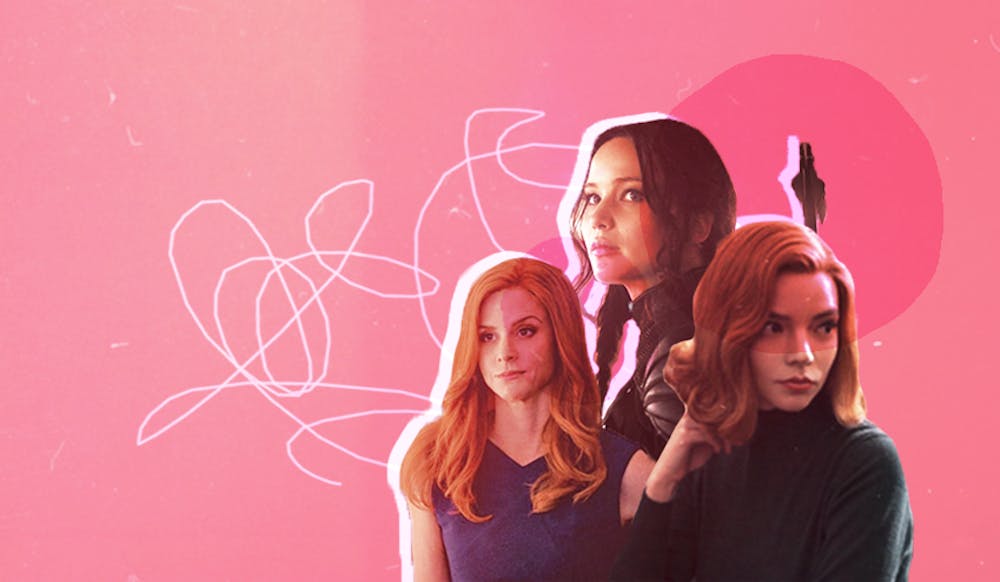Watching female protagonists girlboss their way through academic life, the workplace, and relationships, one can’t help but adopt their mannerisms in hopes of emulating their success or sense of security. Gone are the days of damsels in distress waiting for their knights in shining armor to save them from their woes, exemplified by Mary Jane in the Spider–Man Trilogy and the Bond girls. In their place, we have independent, witty, and badass female protagonists who are characters in their own right as opposed to mere dramatic devices.
In recent weeks, "the feminine urge to ___" meme has proliferated social media and Twitter in particular, where the trend was popularized by users @fringeffect and @9wacie. The concept is to frame something niche as an experience that's universal and inherent to girls. By summarizing the female experience, we are able to reflect on the societal expectations that come with it.
Take the example of Beth Harmon from The Queen’s Gambit, the Netflix series that attracted 62 million viewers in the first 28 days of its premiere. A precocious child, she confounds experienced chess players with her powerful intuitions. Her dedication to the game is indisputable, from replaying previous matches on the chess board and analyzing games in chess books to going as far as consuming tranquilizers in order to visualize chess pieces on the ceiling. This creates the conditions for her success in the male–dominated industry, which raises eyebrows and questions.
When a journalist cites the provocative claim that her love for glamor makes it difficult to take her seriously as a chess player, Beth replies, “I would say that it’s much easier to play chess without the burden of an Adam’s apple.” She doesn’t take shit from anyone and eventually gains global recognition for her brilliance.
Just as the audience starts to feel distant from the experience of being a child prodigy, Beth Harmon’s relatable perfectionism comes into play, leading her down a self–destructive path littered with substance abuse before circling back to her roots—a genuine love for chess. Her character typifies the feminine urge to self–sabotage as a preemptive strike against possible failure.
Paralleling Beth in a workplace setting, we have Donna Paulsen from Suits. She’s intelligent, insightful, and charismatic. Her contribution to the fictional New York City law firm cannot be overstated; in times of crisis, she’s the voice of reason—her brutal honesty keeps the impulsive Louis from making poor decisions in the heat of the moment.
Donna’s success story from working as a secretary to becoming the COO of the law firm is inspirational, but it is her capacity for empathy and refusal to compromise her humanity under any circumstance that makes her such an admirable character. Her confidence and astute judgment frequently divert the attention away from male protagonists Harvey Specter, Mike Ross, and Louis Litt, offering young female viewers a different picture of leadership in the workplace. In her character, we observe the feminine urge to act as a man's conscience because he gave it up while climbing the corporate ladder.
Last but not least, the paradigmatic girlboss of the 2010s—Katniss Everdeen from The Hunger Games. She volunteers in place of her younger sister, Prim, to participate in a nationally televised event where youth fight to the death for entertainment. However, she refuses to play by the rules, and attempts to take her own life with Peeta to undermine the Games’ goal of crowning the sole survivor. In successfully reclaiming some power, she fuels the feminine urge to make a statement by eating poisonous nightlock berries.
While female characters have historically been reduced to a singular identity, Katniss possesses the responsibilities of a sister, warrior, lover, and symbol of the revolution (against the Capitol government). Her multifaceted character makes her a complicated heroine, but one that empowers young female fans nonetheless.
Yet here’s the thing about strong female characters—they don’t exist in real life. As relatable as they are and as much as we want to see the underdog thrive, they set standards that are simply impossible to meet.
Reminiscent of the 1920s standard for women being able to “do it all,” portrayals of strong female characters in film propagate unrealistic ideals about what success entails for women. You have to be both beautiful and brilliant (it’s not enough to just be the latter). You have to be confident, but in an effortless way. You have to have a flourishing love life, or, at the very least, a myriad of love interests.
It’s fine to indulge in films that allow you to channel your inner girlboss and live vicariously through inspiring, powerful women, but it’s also important to remember that the strong female characters we aspire to be are rooted in fantasy.

